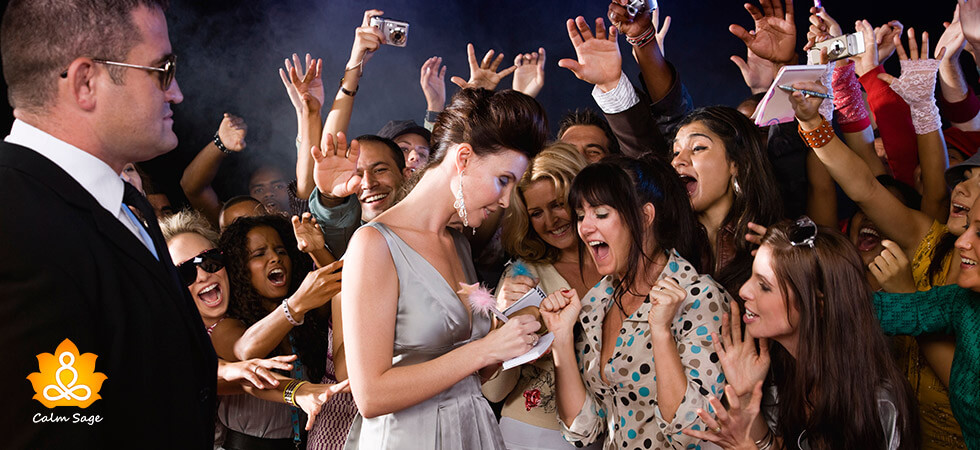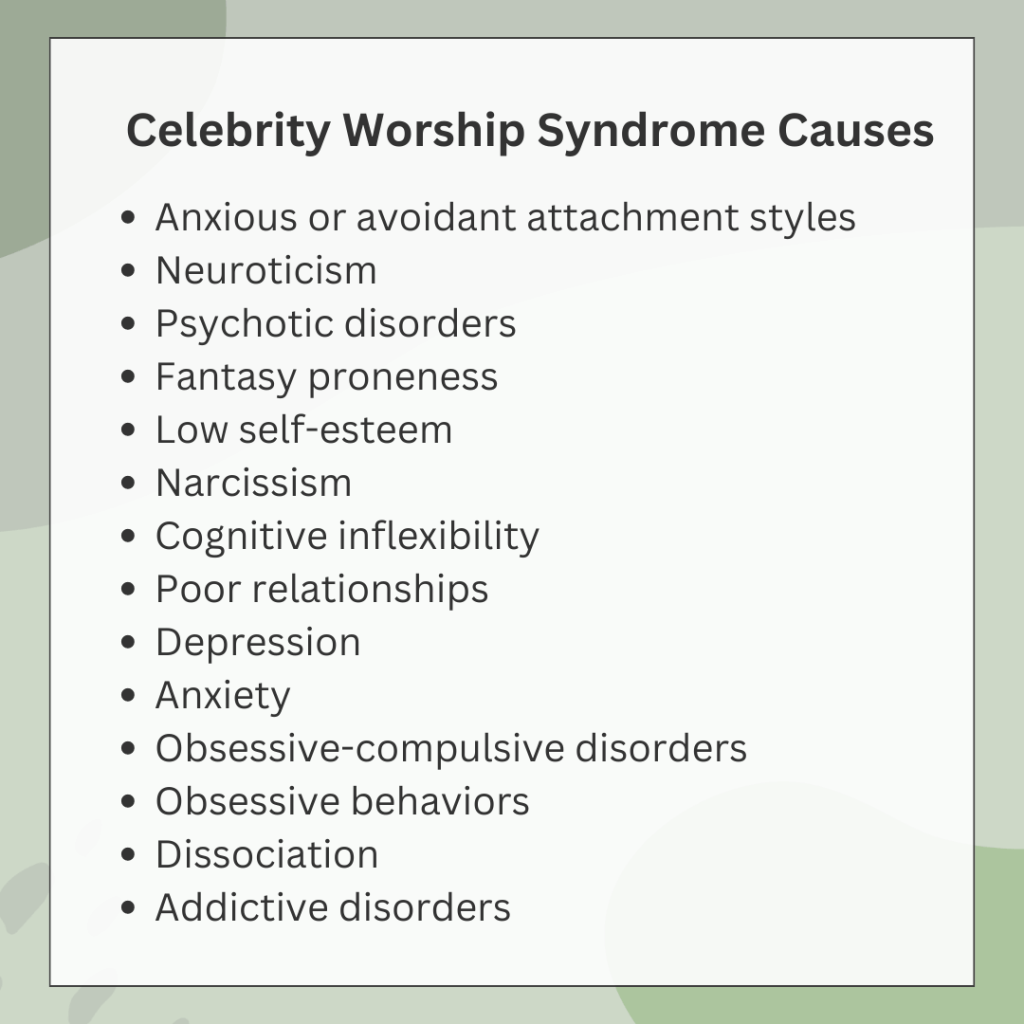Is Celebrity Worship Syndrome a Real Thing? | Causes And Impact

Who doesn’t want an idol to look up to or a role model who can guide them from afar? I do! And I’m sure many think like me. One of the reasons I want a celebrity role model is because they are impressionable and have an air of confidence that makes everything seem so easy. So, it’s only natural that whatever they do, inspire others to do the same.
However, there are times when celebrity motivation can turn into celebrity obsession. This fanatical obsession is termed celebrity worship syndrome. When your simple admiration for a celebrity turns into stalking them obsessively on social media and replicating whatever they do in their daily lives, even going so far as to share all experiences with them (from afar, of course), it can indicate something more than just healthy admiration.
A celebrity may leave an influence on your life and while there’s nothing wrong with that, there may come a time when you begin to lose your identity and instead become someone whose self-identity depends on another person. One who is not aware of it, either.
In this blog, let’s take a look at what celebrity worship syndrome means, what causes it, and how celebrity worship syndrome affects your life and relationships.
Celebrity Worship Syndrome: What It Means
The term “Celebrity Worship Syndrome” stems from Parasocial relationships. A Parasocial relationship is when your fascination with a celebrity or influential person turns into a preoccupation. While it may remain unofficial for now, celebrity worship syndrome is, however, described as an obsessive-addictive disorder.
Just like Parasocial relationships, this syndrome is a one-sided and non-reciprocal relationship and involves one person putting their time and energy into forming a connection with another person, who is blissfully unaware of the former’s existence. In our case, we’re talking about celebrities.
Have you ever heard of celebrity crushes? Well, celebrity worship syndrome is the obsessive version of it. Here’s an example that’ll help you understand this syndrome a bit better;
Celebrity Crush; this time I’m talking about the movie from 2019; The movie is about a deranged fan who holds the star of a movie in her home until he falls in love with her. This is a thriller movie and you can check more about it here. Why am I mentioning this movie all of a sudden? Because it is a classic example of celebrity worship syndrome.
Parasocial relationships are very common, more so than you might think, but they aren’t always negative. Sometimes, the connection between you and your celebrity idol can help you develop skills and learn more about how to act and present yourself in public.
I can admit to you here that I have crushes on fictional characters and while my friends and family make fun of it, I know how much strength my fictional crushes give me when I feel myself floundering.
Celebrity worship syndrome is not just a parasocial relationship, mind you. It’s a disorder where a person exhibits a pattern of obsessive, compulsive, and addictive behaviors often causing borderline pathological worship.
What Causes Celebrity Worship Syndrome?
For now, psychologists haven’t been able to come up with a plausible explanation for why celebrity worship syndrome develops. However, it is believed that because this syndrome is an obsessive-addictive disorder, the causes could be related to mental health conditions.

People at a high risk of developing borderline pathological celebrity crushes or celebrity worship syndrome might be those living with these conditions;
- Anxious or avoidant attachment styles
- Neuroticism
- Psychotic disorders
- Fantasy proneness
- Low self-esteem
- Narcissism
- Cognitive inflexibility
- Poor relationships
- Depression
- Anxiety
- Obsessive-compulsive disorders
- Obsessive behaviors
- Dissociation
- Addictive disorders
Daydreaming is also recognized as another common factor that can increase the risk of you developing celebrity worship syndrome.
But, what does this disorder look like?
How to Recognize Celebrity Worship Syndrome?
When something – even a simple admiration or fascination – is continuous, it can manifest itself in different ways. Sometimes, too intensely as well. Here’s what celebrity worship syndrome may look like;
If the case is mild, then it could present itself when you name your child after the celebrity or maybe change the way you act, behave, or dress. All of this is done based on the celebrity idol you have.
Now, if the case is more than just mild, then the presentation of the syndrome could be intense. For example; getting cosmetic surgery to look like them, harassing them, stalking them – physically or socially, and even interacting with them that borders on pathological.
The Effects of Celebrity Worship Syndrome
When we look at it from a larger perspective, celebrity worship syndrome might not affect your life on a large scale, but it can still leave some impact on your relationships and overall well-being.
When we talk about relationships – be they intimate, professional, or social – celebrity worship syndrome can affect them quite negatively. How? Well, for starters, you may begin to avoid all social engagements and prefer to engage in celebrity worship content or anything that your celebrity idol updates.
Not only that, but you may also begin to compare your partner with the celebrity idol or ignore your partner in favor of your celebrity idol.
If we talk about professional life, then you may avoid opportunities that come your way if they fail to align with your celebrity’s cause, charity, or representation.
When we talk about life in general, celebrity worship syndrome can impact your well-being. Celebrity worship syndrome could be a manifestation of addictive disorders that makes you inclined to engage in unhealthy behaviors such as stalking or harassing the idol. You might also decide to change your personality to better align with the one you obsessively admire.
This kind of behavior may also prompt comparisons if you have low self-esteem. You may be overly sensitive and judgmental towards yourself if you believe that you can’t meet your celebrity idol’s standards.
Yet, there are some positive effects to having a Parasocial relationship. Being in a Parasocial relationship with an idol can motivate you to become a better person, help you learn healthy ways to live, and even encourage positivity in life.
Wrap Up
Admiring celebrities isn’t a bad thing but it can be unhealthy when the line between healthy admiration and obsession blurs. We all want someone to look up to in times of distress and if you have a celebrity or an influential person you can look up to, then good for you. It’s even natural to have a role model who has reached celebrity status.
However, when your fascination with celebrity turns to celebrity worship syndrome, then it could have some pretty negative consequences on your relationships and life, in general.
If you or someone you love is showing signs of celebrity worship syndrome or other obsessive-addictive behaviors, then it is recommended that you speak to a professional mental healthcare provider.
I hope this blog helped you understand what celebrity worship syndrome is, what it looks like, and what causes celebrity worship syndrome. For more, you can write to us at info@calmsage.com or leave us a comment in the section below.
Take Care!




















